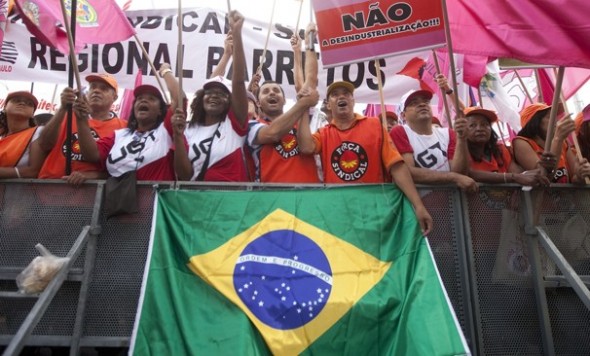April 5th, 2012
The Brazilian group that forced work to stop at the stadium being built for the 2014 World Cup opener plans to intensify protests across Brazil, saying the poor are paying the price for the government’s decision to bow to FIFA’s demands.
The Homeless Workers Movement said Thursday that it will organize protests to draw attention to problems it says are caused by World Cup projects, especially the evictions of “thousands of working families.”
There were protests Wednesday in eight of the 12 host cities. Hundreds of protesters forced work to briefly stop at Sao Paulo stadium, which is set to host the opener. There also was a temporary road block near Castelao stadium in the city of Fortaleza.
The homeless movement, known for its Portuguese acronym MTST, said more than 1,500 people protested across Brazil on Wednesday, although authorities disputed the number.
World Cup organizers and local authorities said they’re not concerned and the protests did little to disrupt the country’s preparations, but MTST warned there was more to come.
“We are not going to stop,” said Normalina Moreira dos Santos, a MTST spokeswoman in Sao Paulo. “We are going to plan many more protests to show what’s wrong with how the World Cup is happening in Brazil. We need to keep working to get the community more involved and let people know what is happening.”
MTST said it wants to draw the attention of authorities and call for a nationwide referendum to ask the population whether they actually want the World Cup in Brazil at this cost.
“We are not against having the World Cup here,” dos Santos said. “We are against how these evictions are happening. And we wished part of this money used in the World Cup could’ve been used in more housing for those who need it.”
MTST is the biggest of the groups that joined the Resistencia Urbana movement to protest against what it calls the “crimes of the 2014 World Cup.”
“The goal of the campaign is to denounce the evictions and removal of thousands of working families because of the World Cup work,” the group said in a statement. “The goal also is to denounce the creation of laws just for the upcoming mega events such as the World Cup and the (2016 Rio) Olympics.”
The movement said it’s not fair for the Brazilian poor to be hurt just because the government has to abide by FIFA’s wishes.
“What we are seeing is the Brazilian government bowing to FIFA’s demands and to the real estate market,” it said in a statement. “That’s happening at the expense of the urban workers and of their right to housing. The World Cup will only benefit the big companies.”
Some of the infrastructure work needed for the World Cup and the Rio Olympics have required the eviction of some local residents, but Brazilian authorities claim the entire process is being conducted strictly according to the law.
MTST said 700 people invaded the construction site at Itaquerao Stadium in Sao Paulo, disrupting work at the venue for two hours. Authorities said the number of protesters was about 300 and the work stoppage lasted nearly 30 minutes.
A road leading to Castelao Stadium in Fortaleza was blocked for about an hour and a half, and there were peaceful acts in front of Maracana in Rio de Janeiro, Estadio Nacional in the capital of Brasilia and in the cities of Belo Horizonte, Curitiba, Cuiaba and Manaus.
“It was very important to show society that what is happening in Brazil is not right,” dos Santos said. “We are proud, I think we reached our goal with the protests.”
The protests came as the Brazilian senate is about to consider a controversial World Cup bill that gives FIFA the needed guarantees to organize the event. FIFA says Brazil agreed to the legislation changes when it accepted hosting the tournament in 2007, but critics say the country is giving soccer’s governing body too much power.
Among the law changes asked by FIFA involves the sale of alcohol inside stadiums, currently prohibited in Brazil.
MTST has been active in Brazil for several years, occupying vacant buildings in the main capitals to demand more housing for the poor. It is the urban reflection of Brazil’s landless movement, which has seen hundreds of thousands of people in the countryside invade farm and ranch land in recent decades looking for room for subsistence farming.
Source: The Washington Post


Leave a Reply